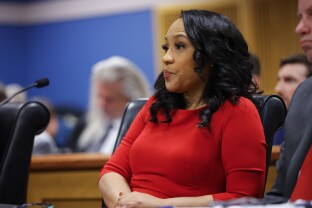What was once widely considered the strongest criminal case against Donald Trump is now on life support.
The Georgia appellate court’s decision on Thursday to disqualify Fulton County District Attorney Fani Willis from the election interference case she built has essentially doomed it, experts say, all but ensuring the end result looks nothing like the trial of the century so many anticipated.
While Willis has been yanked from the case, as the direct result of a sexual affair she had with a member of her own team, the indictment is still intact.
Appellate judges didn’t tear up Willis and her teams’ work, though close legal watchers in Georgia say the case is essentially back at the starting block.
Willis can appeal to the state’s high court, but a loss — which is expected — would ultimately mean that a little-known administrative body would reassign the case to another DA.
But few will want to take the case, and anyone who does is sure to change it, University of Georgia law school Professor Emeritus Ronald L. Carlson told NOTUS.
“We’d be close to setting the clock back to zero. It would be essentially a major study by the other county. There’s a lot of record in this case, especially with the special grand jury,” he said.
Part of the challenge is that most of the state’s elected district attorneys are Republicans who aren’t willing to pursue a case against Trump for his intimidating phone calls to state officials and his attempt to forcefully overturn results there in 2020. On top of that, even the Democratic local DAs in the Atlanta metro area could be reluctant to adopt a complex racketeering case involving 19 defendants — one of whom will be president in 31 days.
“That’s not an easy assignment for a brother or sister DA’s office to take,” Carlson said, citing the huge “financial drain” of merely adopting the case as is.
He also noted that it’s possible “the momentum for another office to take over the case has been mitigated or blunted to a certain extent by the election of Donald Trump.”
The incoming president could now enlist the taxpayer-funded Department of Justice to fend off any efforts to hold him accountable in Georgia state court, as he did during his first term against a rape defamation case he ultimately lost against news columnist E. Jean Carroll. Trump could also be legally shielded from litigation by a conservative Supreme Court that has already granted an extensive new definition of presidential immunity.
What that means is that whatever DA takes on the case could choose to severely narrow the investigation — dropping several defendants or even scrapping the indictment altogether.
If it morphs into a case against Trump alone, other legal scholars tell NOTUS that the prosecution will likely be put on hold until he leaves office. That appears to be the current strategy of Manhattan DA Alvin Bragg, who secured a jury conviction against Trump but left the door open to have him criminally sentenced when he leaves the White House.
Then again, the next Georgia County DA to take this case could do the opposite and drop Trump as a defendant and instead focus on all of his associates, who played key roles in his plan to flip election results in Georgia. That would be a monumental effort without the payoff of targeting the man sitting atop the pyramid.
But all of these scenarios still rely on the Prosecuting Attorneys’ Council of Georgia playing ball. And it might not.
In 2022, a judge decided to disqualify Willis for hosting a political fundraiser for the rival of someone she was investigating. The subject of her investigation, Burt Jones, one of Trump’s fake electors, ultimately won the lieutenant governorship.
In September, the council of prosecutors finally weighed in — opting to let Jones go and releasing a statement that portrayed the politician as a cautious co-conspirator who was hesitant to serve on Trump’s alternate slate of electors in a grander scheme to reverse congressional election certification.
Peter J. Skandalakis, the council’s executive director, concluded that Jones acted “within the scope of his duties” as a state senator and chalked up his involvement with the fake elector scheme to bad legal advice.
“That might telegraph that he just thinks this entire thing is not worthwhile,” said Anthony Michael Kreis, who teaches law at Georgia State University. “This is now really up to one person. And he really has no accountability to anybody.”
“This is a complete disaster,” he said.
Kreis vehemently opposes the appellate court decision, criticizing the way it overruled a trial judge by pulling Willis from the case while simultaneously acknowledging that her affair didn’t actually create a tangible conflict of interest.
In essence, it just looked unprofessional — and judges weren’t having it. “An unforced error,” Kreis said.
“It was stupidity on the part of Fani Willis,” he said.
“What’s so hard for me to wrap my head around is that she spent so much time, energy and resources on doing this investigation right by impaneling the special grand jury to make sure every stone was unturned and make sure that the indictment was rock solid. Why would you risk it? If you think you’re the thin line between democracy and authoritarianism, why do it?”
—
Jose Pagliery is a reporter at NOTUS.
Sign in
Log into your free account with your email. Don’t have one?
Check your email for a one-time code.
We sent a 4-digit code to . Enter the pin to confirm your account.
New code will be available in 1:00
Let’s try this again.
We encountered an error with the passcode sent to . Please reenter your email.


